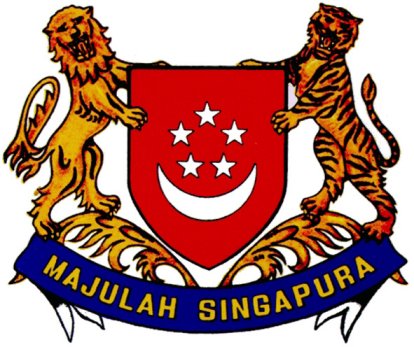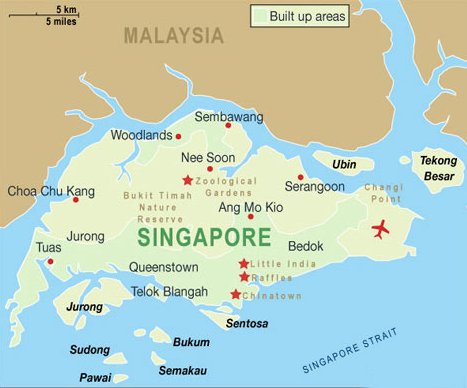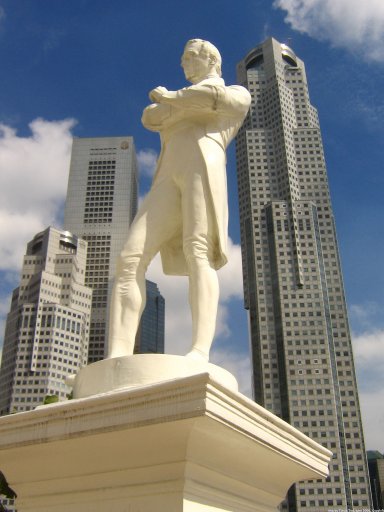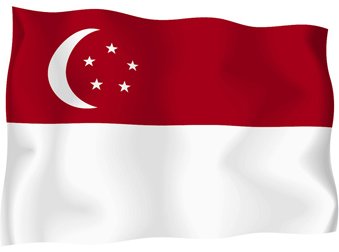Month 3:20, Week 3:5 (Chamashee/Teruah), Year 5935:076 AM
Omer Count Day 12/50
Gregorian Calendar: Tuesday 21 June 2011
Singapore
Appearances or Reality?

As it is my birthday soon and I shall be feeling increasingly mortal for yet another year, I thought I would break with my usual subject material of gospel and current events and share a little more about me and my place of birth. After all, it is only right that those ministered to know something about their minister.
As some of you know, my roots are in Singapore and Malaysia. And whether we care to admit it or not, we are shaped by the environment in which we were born and raised. Every now and then I meet a brother or sister from these countries and it prompts me to look back and remember, and ask the question: "Why did Yahweh cause me to be born here?"
I am not only very proud of my place of birth but very grateful too. In so many ways, Singapore is the melting pot of the world and in that respect is not unlike the United States, only it is much smaller, a mere 225 square miles of diamond-shaped city and jungle, though there is increasingly less and less of the latter now. A mere 60 miles from the equator, closer to it than any other Asian city. It lies in the path of two monsoons which splash an average of 96 inches of rain annually into the thick steamy jungle vegetation and overburdened city storm drains.

I was born in British Colonial Singapore by accident, my parents actually living in Kuala Lumpur, and had I been born an hour earlier, I would have come into the world aboard a Douglas Dakota DC3 flying above the waters separating Malayan Johore from Singapore island. Yes, my mother went into labour several thousand feet above planet earth and had I been born in the plane, I would have become the citizen of the national airline. As it was, I was born in Changi Hospital with the help of an Austrian doctor. A nice international touch, I think.
My second stay in Singapore was just as dramatic but instead of the venue being a hospital, it was a prison. No, I was not an incarcerated felon, but under British military protection along with my mother, for this was the time of the National Emergency when communist terrorists were fomenting revolution in the wake of the communist takeover of China. The streets were dangerous with shootings and killings occurring daily. So I have also been a guest of Changi Prison and for my own good.
That would not be my first or last encounter with communists, who seem to bug me wherever I go. On one other occasion I narrowly missed a communist attack near Batu Caves in Malaysia which left many dead. The other was a closer shave with death when we had been on our annual vaccation to Cameron Highlands. There is a long ascent up windy roads hugging steep hills and the communists had chosen to make this the site of an assassination attempt on a high-ranking British government and military official. Unknown to us at the time, we had passed through the communist ambush site in the hills - they had let us through as we were not the target - but the column that would follow on after us a few hours later was attacked and the official with several attendants killed. The communist insurrection was not, mercifully, successful and its leader and his guerillas eventually took refuge in Thailand where he died in ignominity.
Singapore is a multi-racial society, like Malaysia but more so, and this has had a profound influence on me for I grew up with friends of many races. The colour of someome's skin, their culture, religion and languages was to me all a part of the rich tapestry of life. My friends consisted of the whole spectrum of society from the children of labourers to a Malay son of the Sultan of Selangor, so I grew up in an environment where race and class meant nothing. I knew English, Scots, Irish, Welsh, Australian, Dutch, Chinese (mostly Cantonese), Malay, Tamil, Sikh, Thai, and the inevitable Eurasian mixes. My Godmother was half Thai (of royal blood) - from Changmai - and half Scottish.
Though originally one country, Malaysia and Singapore eventually parted ways and Singapore became independent, a move which I think was definitely right. In many ways, I believe Singapore has chosen a safer path than its larger neighbour, though I do believe its rejecting trial by jury to have been a serious mistake. I recall some years ago the case of an American teen who vandalised some cars in a parking lot and was arrested. His punishment was to be a flogging. Americans went crazy thinking this was an extreme, neo-feudal response and as I remember I think the sentence was eventually reduced. I had mixed reactions at the time for one the one hand it was too extreme but on the other it reflects a policy of law and order which ought to be the envy of the West - there is no pussy-footing in Singapore. Singapore does not tolerate crime and this, I believe, because of the Chinese pragmatism and wisdom of Prime Minister Lee Kwan Yu and his People's Action Party whom I was a great admirer of, is to be commended. It is a safer place to be than most Western states.
There is much the world could emulate in Singapore, including my later homelands of Great Britain, Norway and Sweden who have 'lost it' in so many ways. I am a great believer in the Asian Family Ethic. It is ironic that whilst Britain brought civilization to Singapore in the 19th century (and the Singaporeans are not too proud to see the positive benefits of colonialism), there is now a case for Singaporean civiliation being brought to Britain to tidy up the social and political mess the élitists have created there. Indeed, it has long been my belief that in the last days it will be missionaries from Asia - and principally China - who will be bringing the Gospel back to Europe where it has long since vapourised.
The British heritage in Singapore has always been a conveniently neutral benchmark for local history. The English language has long been a unifying factor among the many cultures and has become a dominant force linking Singapore with Western business. As Minister S.Rajarantnam said of a statue of Raffles (see below), the colonial founder of British Singapore, in 1969, "he escaped by a narrow margin. Now we have polished him up. He has an honourable place. To pretend he did not found Singapore is the first sign of a dishonest society". And though Singapore has its corruption like any other nation, it is not nearly as deep as in most other countries. This is a country Singaporians can be proud of.
I am a son of the last breath of British colonialism, though I was too young to participate much in it. I left Asia for good when I was 13, though in practice 3 years before. Both nations became independent not long after I was born, my parents remaining behind as expats, having arrived in the 1940's. So I have little time for the blanket scorn poured on colonialism by modern neo-Marxists for the pure and simple matter that we have all been colonies of someone in our histories with the Marxists being the worst colonialists of all. Wherever their Red Armies have invaded countries, they have not only imposed their own brand of militant and repressive colonialism but also engaged in ethnic cleansing. I do not, in saying this, by any means give carte blanche to British colonialism which had its good and bad sides, the latter principally consisting of economic exploitation.
Stamford Raffles was, in my opinion, one of the 'good class' of colonialists and his rule undoubtedly benefitted Singapore. He rightly noted:
"The acquisitions of Great Britain in the East have not been made in the spirit of conquest. A concurrence of circumstances not to be controlled, and the energies of her sons, have carried her forward on the tide, whose impulse has been irresistable" (Sir Thomas Stamford Bingley Raffles, 1819.

Singaporeans remember Raffles as a man of high principles who opposed the slave trade that was rife in the island when the British arrived and disapproved of the Chinese penchant for gambling. Raffles gave an almost definitive summary of the British colonial ethos when he said:
"While we raise those in a scale of civilization, over whom our influence is extended, we shall lay the foundations of our dominion on the firm basis of justice and mutual advantage, instead of on the uncertain and unsubstantial tenure of force and intrigue...Commerce is the principle on which our connections with the Eastern States is formed...Education must keep pace with commerce in order that its benefits may be ensured and its evils avoided; and in our connection with these countries, it should take care that, while with one hand we carry to their shores the capital of our merchants, the other shall be stretched forth to offer them the means of intellectual improvement...Our objective is not territory, but trade, a commercial emporium and a fulcrum, whence we may extend our influence politically as circumstances may hereafter require".
One Singaporean described this as "enlightened imperialism". But the conquest of Singapore by the Japanese in 1942 was a watershed in the relationship of the British with the local people who either felt abandoned or perceived that the British had bungled in the defence of the island. Though welcomed back in 1945, it became clear that everything had changed. Singapore moved toward independence and a fully elected government in 1959, with full independence coming in 1965. British influence remained until the 1970's and 80's, the next generation not sharing the sentiments of their elders and instead turning to the USA, Australia and Japan for rôle models. Gone is the empathy for Britain's famed non-materialism and genteel pace of life, and its system of jurisprudence. Since the 1980's the country has warned against the dangers of 'unbridled democracy'.
To be realistic, then, I have to say that the influences on my personal life belong more to the previous generation than to the present one. I can only relate what I experienced in Singapore and Malaysia. Just as I have been influenced by 25 years in Norway and Sweden by a process of psychic osmosis, so the gentleness of the Malays, the industriousness of the Chinese, the colourfulness of the Indians, and the competitiveness of the Dutch all played their part too.
To this day I have lively recollections of, and sympathis with, the work ethic of the Chinese, their little family-owned shops opening at dawn and closing late at night. My most vivid memory of the Chinese was a barber's shop in Malacca and the cold steel of a hand-operated hair clipper on my neck clacking away soothingly like crickets rubbing their legs in the undergrowth, and sharing a bowl of plain rice with our cook guzzling it down with chopsticks. I remember elaborate Chinese wedding feasts, the firecrackers and dragon operated by a human train dancing down the street on Chinese New Year, but most of all I remember the kindly faces of our Chinese cook and Amah (and their daughter Ah Yoke) who were a part of the family and like an extra pair of parents. He apparently made an offer to buy me off my parents when I was a baby and prophesied that I would become a great beer drinker like my father when I was grown-up. In the first he was unsuccessful and in the latter - well, let us just say that he did not have the spirit of prophecy! I have always been teetotal.
Though a part of the colonial system and its aftermath in post-Merdeka (Independence) Malaysia, my father was the least 'colonial' in his attitudes. My mother, on the other hand, seemed to have been smitten with it to a certain degree, though neither were racist and took a 'live-and-let-live' attitude which is very much the Singaporean way too. This has been mine also, with respect to other cultures and religions, and really the only realistic one. This was always the policy of the British colonial way, allowing different ethnic groups to live their lives and customs in peace - together with a sense of 'fair play'. One thing my mother did partly absorb from the European colonial milieu, which I never much liked, was the conventions and petty proprieties of pre-war British middle- and upper-class suburbia which, when applied rigorously tended to separate whites from Asians. Though, as I say, no such separateness (mercifully) existed in our home, there was sometimes an artificial sense of 'putting on appearances' for the sake of 'setting a standard' for the 'natives'. I am sure the purpose was well-meaning rather than snobbish, for my mother had no problem mixing with different races and cultures, but to me it smacked of artificiality and was a denial of reality and of shared humanity. This was an unfortunate legacy of the Mem-Sahib Syndrome, as I call it.
In this respect, I have always favoured the down-to-earth approach of King David who was definitely a 'man of the people' and was not corrupted by the trappings of wealth that he bequeathed to his son, Solomon, which may have partly contributed to the latter's corruption and downfall. I am very much at home in the multi-ethnic environment and when I was at Oxford University surrounded myself with Chinese, Indian and Malay friends along with various Europeans. I took much pleasure as founder and president of the Oxford Asia Group - which was an association of Malaysian, Singaporean, Japanese and Taiwanese student organisations - and produced a cultural magazine called Focus in 1976 and 1977. It was in the latter year that I was born again and became a believer.
Since then, Yahweh has been reshaping me. I have retained many of my Eurasian family and cultural values which are definitely Torah-compatible. Singapore and Malaysia gave me a unique window into Islam, Hinduism, Sikhism and Buddhism which were the the religions of most of my Asian friends (unless they were Anglican or Catholic) and taught me how it was possible to get on with others of different faiths provided everyone treated each other as equals. There was no need in such an environment for all the nonesense of political correctness and multiculturalism, the latter being a complete anachronism especially when set in a framework of humanism.

Singapore has not felt the need to rewrite its history because of the modern Marxist politic that wishes to reduce everything and everyone to the lowest common denominator. Instead, communities retain their differences and distinctives and work and live together peacefully - there are no Marxist cultural utopias in the offing. The communists had their chance, lacked popular support, and have no appeal any longer.
Public evangelism in Malaysia and Singapore is, admittedly, restricted in order to maintain this peace, but believers find numerous ways to witness and Christianity is growing. In Singapore, about 18% of the population is Christian, of which about 33% is Catholic and the rest Protestant (mostly Anglican, Methodist and Presbyterian). The Declaration of Religious Harmony, a statement affirming harmony between the Singaporean religions, was produced at the instigation of Prime Minister Goh Chok Tong in 2002 following strains in racial harmony because of the activities of the Muslim Jemaah Islamiyah terrorist network. This Declaration is recited by all citizens every 21 July on Racial Harmony Day and basically respects that Singapore is a secular state and that all the races and religions should be respected through mutual tolerance, confidence and understanding and that religion will not be abused to create conflict and disharmony in the nation.
Though well-meaning, this does place limitations on public evangelism. As to how Singapore will socially and religiously evolve, time will tell. My origins in Singapore and Malaysia have given me somewhat of an internationalist outlook whilst at the same time I believe in the importance of nation-states. If nations would live together as the multi-racial and multi-religious inhabitants of Singapore live together, then there would be comparitive peace in the world. What we do not need is a New World Order which would blur all distinctives of religion and culture and turn the world into an homogenous Marxist state ruled by a super-élite of the rich. Though too restrictive in some respects, I do believe there is much we can learn from Singapore.
I count it as one of my homelands and the place where I began.
 Share
Share
|


